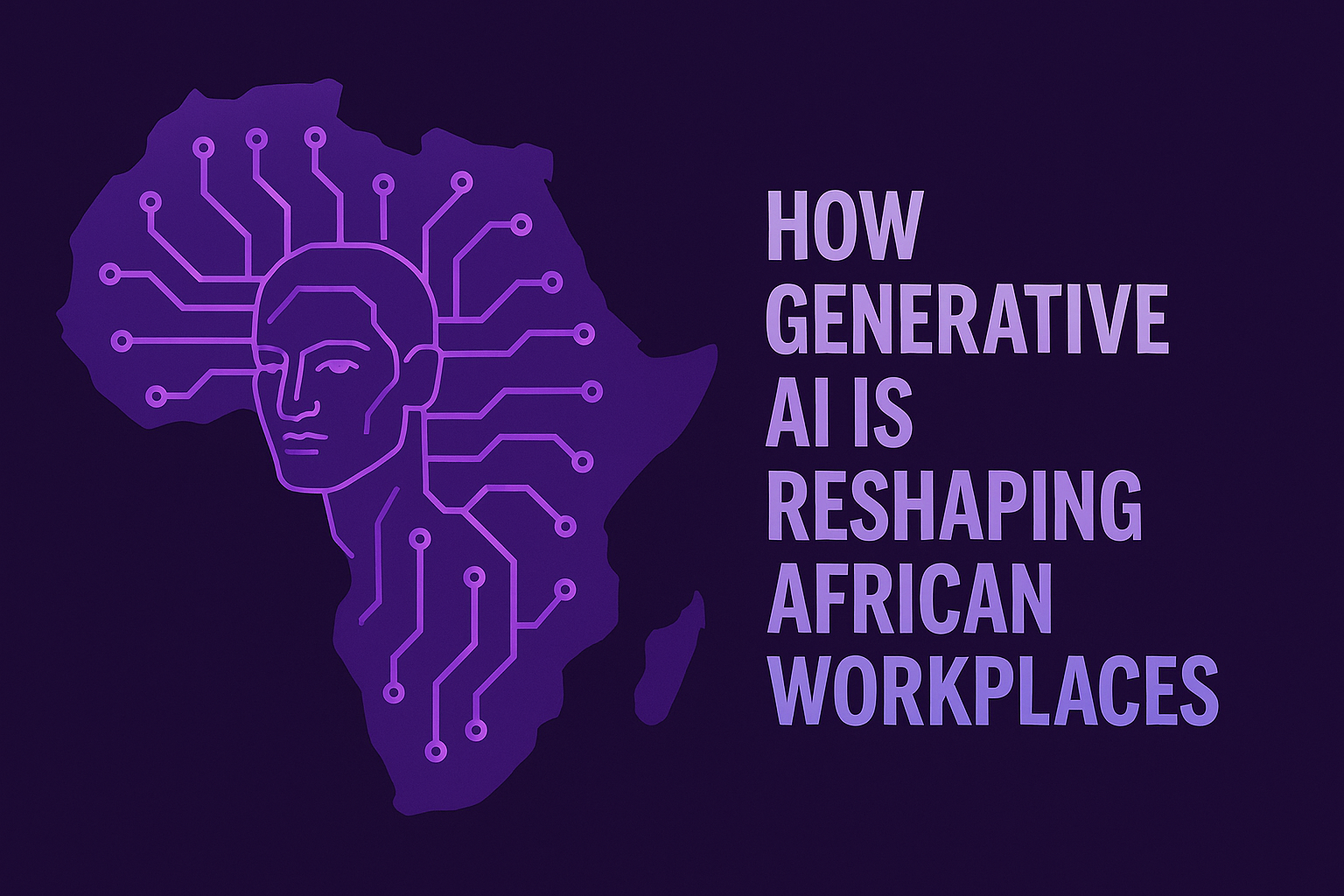How Generative AI is Reshaping African Workplaces: Insights from the Front Lines
Generative AI is no longer a distant promise—it’s actively transforming how African businesses operate, solve problems, and scale. Drawing from real-world insights and experiences across the continent, this article explores how AI is enhancing productivity, reshaping skills, and unlocking localized innovation. With a careful balance of opportunity and responsibility, African companies are beginning to lead their own AI revolutions, quietly, powerfully, and on their own terms.
Eliud Njoroge
Staff Writer

Over the past decade, I’ve had the privilege of witnessing firsthand the rapid evolution of Africa’s tech industry. Today, the landscape is being reshaped dramatically by Generative Artificial Intelligence (AI), transforming workplaces, business processes, and employment opportunities across the continent. From my experience working with numerous enterprises, I can confidently say the impact of AI is profound, far-reaching, and incredibly promising.
Boosting Productivity: Doing More with Less
One of the most immediate effects I’ve observed from AI adoption is a significant boost in productivity. Tasks that previously took teams days or even weeks can now be completed within hours, thanks to the automation of routine processes and the ability of AI to deliver swift, accurate insights.
For example, I’ve seen companies implement AI-driven customer service chatbots fluent in local dialects, dramatically improving customer interactions and response times. Financial departments that adopted AI for data analysis are now making faster, more strategic decisions, enhancing profitability. Even supply chain operations benefit greatly, with AI enabling precise demand forecasting and reducing inventory waste.
A colleague here at iWorldAfric recently highlighted how one of our client companies successfully leveraged generative AI solutions to significantly enhance productivity.This case perfectly illustrates how businesses that embrace AI gain competitive advantages and rapid growth.
Transforming Jobs and Skills: Preparing Our Workforce
The workplace transformation driven by AI naturally influences job roles and skills. While some traditional roles are becoming obsolete, the demand for digital literacy, technical knowledge, and advanced soft skills like creativity and adaptability is sharply rising.
In my interactions with various businesses, I’ve emphasized the importance of investing in continuous employee training and skill development programs. Proactive companies understand that equipping employees with the skills to navigate an AI-driven landscape isn’t just beneficial, it’s essential for survival and growth.
Navigating Challenges with Confidence
Of course, integrating AI isn’t without its hurdles. Concerns around job displacement, data privacy, and the ethics of AI-driven decision-making frequently arise. I always advise organizations to adopt a strategic approach, emphasizing transparency, clear communication, and robust ethical guidelines.
An important part of successful AI adoption involves establishing trust. Companies that openly communicate how AI impacts their processes and take responsibility for ethical implications enjoy greater acceptance among their employees and customers.
Localized AI Solutions: Built by Africans, for Africa
One size does not fit all, especially in Africa’s diverse economic and cultural landscape. From my perspective, the most successful AI implementations have been highly localized, designed specifically to address local languages, cultural contexts, and unique market dynamics.
For instance, AI platforms that process regional languages such as Swahili, Hausa, or Zulu have seen tremendous success. By supporting home-grown startups and fostering innovation, Africa is building a robust ecosystem capable of creating tailored AI solutions that resonate deeply with local businesses and communities.
Ethical AI: Ensuring Fairness and Inclusivity
Ethical considerations must always accompany technological advancements. Throughout my career, I’ve seen companies thrive when they prioritize inclusivity, transparency, and fairness in their AI deployments. Regular audits, stakeholder engagement, and rigorous oversight are essential to maintain public trust and ensure that AI-driven systems remain equitable and unbiased.
AI’s Social Impact: Empowering African Communities
Beyond business, AI’s social impact on African communities has been profound. In healthcare, AI systems are enhancing diagnostic accuracy and patient care quality, particularly in rural and underserved regions. AI-driven educational platforms bridge significant gaps by providing quality education to remote areas, fostering equal learning opportunities.
Agriculture, too, has benefited immensely. I’ve personally observed how predictive analytics helps smallholder farmers boost productivity and manage resources more sustainably, directly addressing food security challenges.
Embracing the Future
Generative AI represents one of the most significant opportunities for Africa in the 21st century. My years in the tech industry have shown me that businesses that strategically leverage AI can thrive, innovate, and sustain long-term growth.
Organizations such as iWorldAfric exemplify the proactive approach needed to successfully integrate AI into workplaces, serving as a blueprint for others to follow. Our strategic implementation and training programs demonstrate how African businesses can harness AI’s potential effectively and responsibly.
As we collectively navigate this exciting new era, I firmly believe that Generative AI will play a crucial role in shaping the continent’s future, fostering economic prosperity, empowering communities, and establishing Africa as a significant player in global innovation.
Related Topics
Related Articles
Stay Updated
Get the latest insights and trends delivered to your inbox.
We respect your privacy. Unsubscribe at any time.
More Articles
Continue exploring our latest insights and articles